Abstract
The coronavirus has drastically changed the world of work and demands a redesign for organizations and individuals in order to meet the numerous new challenges, such as working remotely and a reduction of resources. In this paper, I propose a self-transcendence model with five main modules: (1) Life is about what I can give rather than what I can get, (2) Replace egotistic pursuits with cultivating connections, (3) Replace the tendency to avoid suffering with the courage to confront challenges, (4) Replace manipulations with responsibility, (5) Focus on innovations rather than the shortage of resources.
*Based on my presentation at the symposium on the Future of Work at the annual Convention of Social of Consulting Psychology, Feb.4-7, 2021
Introduction
In a recent interview with a BBC reporter on how to cope with the pandemic, I said: “The biggest untold story in positive psychology is that suffering may terrifies millions of people, but true happiness is unattainable without it. In fact, the pandemic may be a moment of spiritual awakening. I want to shout from the rooftop: Stop running away from suffering and chasing after happiness but pause and embrace suffering. This would be the first step towards finding true happiness and transformation.” In this paper, I want to unpack the power idea that suffering can be a blessing in disguise.
Indeed, the pandemic has turned the world upside down. Its economic impact is devastating with the majority of countries in recession and many industries crumbling (Jones et al., 2021). At the individual level, countless small businesses have gone bankrupt and millions of people have lost their jobs (Congressional Research Service, 2021). How can people stay positive and optimistic when so many things have gone wrong? What can psychologists do to help organizations and individuals rise from the ashes?
From my experience of working with many clients during the era of COVID-19, I have discovered that they felt much better when I told them: “We are all in the same boat, feeling anxious and stressed, because right now life is full of danger and suffering.” Much to my surprise, they responded with great interest when I shared with them the paradox that the more we try to avoid suffering the more we suffer, but when we are willing to embrace our feelings of loneliness, distress, and anxiety with courage, we begin to gain an upper hand of our painful emotions. They were eager to learn more about how they could cope with the pandemic and lockdown better.
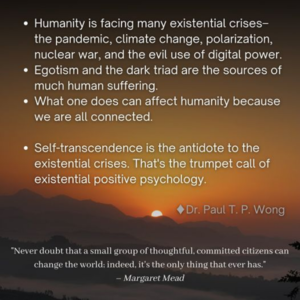 Earlier, I pointed out that the pandemic also provides a rare opportunity for personal and organizational transformation if we learned the necessary lessons, such as tragic optimism (Wong, 2020a). In this paper, I want to lay out several principles of self-transcendence which can completely transform our outlook on life help us cope with the current crisis better.
Earlier, I pointed out that the pandemic also provides a rare opportunity for personal and organizational transformation if we learned the necessary lessons, such as tragic optimism (Wong, 2020a). In this paper, I want to lay out several principles of self-transcendence which can completely transform our outlook on life help us cope with the current crisis better.
More specifically, in the present paper, I want to emphasize that the new science of existential positive psychology (PP 2.0) is needed for the following reasons:
- Humanity is facing many existential threats, from the pandemic to our inherent vulnerabilities.
- We all need to accept and face our dark side of human existence, from tragic events to our Shadow or dark triad.
- Much of human suffering is existential suffering. Even when we have everything to meet our physical or social needs, we may still be tormented with such existential questions as “Who am I?” “Does life as any meaning?” “What is the point of struggling when we all die in the end?”
- Life is full of paradoxes. The powerful paradoxical truth is that “only in darkness can you see the stars”, according to Martin Luther King Jr. In other words, the power of positivity in times of suffering is that we have the innate capacity to shine in the darkness.
Indeed, paradoxically, our character comes from overcoming trials and temptations, mature happiness comes from embracing negative emotions, and tragic optimism results from transcending trauma and despair. There are all kind of psychological and practical benefits hidden behind the surface of adversity. Thus, the new science of flourishing through suffering represents the future of positive psychology as I have advocated during the first decade of 21st century.
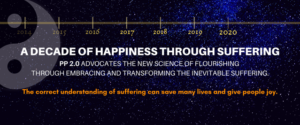
A New Paradigm of Self-transcendence is Needed for the Future of Work
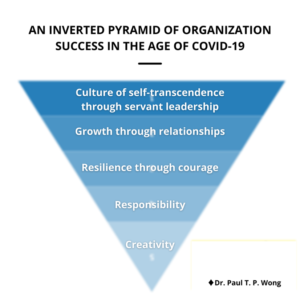 From the new perspective of existential positive psychology, the following diagram of an inverted pyramid show the self-transcendence model for organizational success in the post-pandemic era.
From the new perspective of existential positive psychology, the following diagram of an inverted pyramid show the self-transcendence model for organizational success in the post-pandemic era.
It begins with the need to create a positive corporate culture of self-transcendence–losing oneself in serving the common good as a humble servant (Wong, 2012; Wong & Gupta, 2004; Wong & Page, 2003). This change is needed because the old hierarchical structure of command and control is not flexible enough for the brave new world when most people are working remotely and decisions often need to be made quickly on the frontline without going through the long review-and-approve process. Furthermore, in a digital economy, knowledge workers need to develop their leadership potentials to make good decisions as part of a small team in a flat organization.
Another reason for servant leadership is that even in small groups, there is still the problem that different individuals have different ideas; instead of rational discussion of which ideas are the best, the discussion often degenerates into a battle between oversized egos. As a result, valuable time is wasted. That is why it is important to learn how to reduce egotism through the practice of self-transcendence.

Self-transcendence is the natural antidote to the problem of egotism, especially when the ego is taking a beating in the current pandemic crisis. In the above quote, Viktor Frankl (1946/1985) clearly points out the paradox of self-transcendence – one needs to lose one’s ego in order to actualize oneself and advance the common good.
While Frankl discovered the truth of self-transcendence early in his career because of his painful experience with two world wars, Maslow discovered the same thing much later in his career. He found out from his observation that the pursuit of self-actualization is a dead end because actualized people can still be arrogant jerks without the awakening to B-values, such as truth, goodness, and beauty, which are needed to transcend egotism (Koltko-Rivera, 2006; Maslow, 1971).
In Maslow’s revised need pyramid, the highest level of development is self-transcendence. At this stage, a whole new world opens up when we go beyond the inherent limitations of the self as an isolated biological and psychological entity, as illustrated by the following figure.

When self-transcendence is applied to leadership, the implications are huge. In addition to opening up to the mysteries and wonders of the cosmos, thus, tapping into the boundless resources in the transcendental realm, a servant leader is devoted to serving others rather than feeding one’s own ego. Therefore, it is a natural antidote to all the problems coming from egotism – abuse of power, corruption, and violation of public trust. More importantly, self-transcendence demands a quantum shift in our life orientation from asking “What can I get from others?” to “What can I do for others?” Thus, the first principle of meaning is that life is about what I can give rather than what I can get.
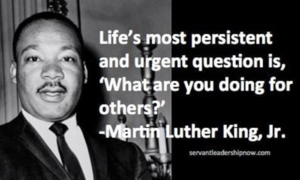
A servant leader contributes to good work at three levels (Wong & Roy, 2018):
- They empower individual workers to develop their full potentials and do their best in spite of difficulties.
- They unite the team to achieve a common goal in spite of individual differences.
- They contribute to the greater good of society.

The best part of being a servant leader is that one can have maximum flexibility and emotional agility (David, 2016) because one is freed from the self-made prison of greed and pride. Being selfless, a servant leader has nothing to lose but fear of failure.
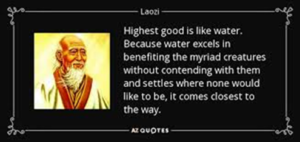
According to Tao Te Ching (Anderson, 2021), the main text of Taoism, the way of a servant leader is to be like water. By not exalting oneself and willing to go to lowly place where nobody wants to go, one is able to benefit all the people within the sphere of influence.
In addition to servant leadership, the self-transcendence model includes four modules of values. Each module is referred to as a triangle because it consists of a set of three interrelated rules:
- The Golden Triangle of innate motivation for connections with one’s true self and calling, with other people, and with God or a higher power.
- The Iron Triangle of summoning up one’s courage to face life in its totality, to accept the dark side of human existence, and to transform all painful experiences into triumphs.
- The Executive Triangle of taking the ethical and instrumental responsibility to do the right thing.
- The Creative Triangle of finding a path where there is no path.
Altogether, there are 12 rules as summarized below. Each of these 12 rules can be translated into a skill or competence that enables us to transcend our inherent limitations, vulnerabilities, and external constraints. Thus, self-transcendence is a lifelong learning process of how to grow beyond oneself.
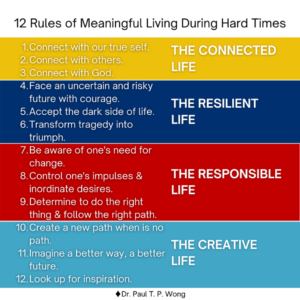
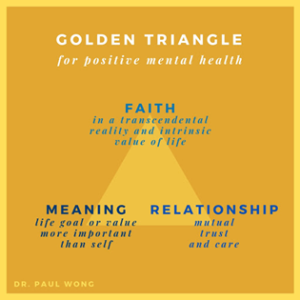
The Golden Triangle represents one’s spiritual yearning for connections, which make us fully functioning human beings. A more detailed graphic representation can be found below, which explains why a meaningful life is based on the universal value of faith, hope, and love. Without these three spiritual qualities, one will continue to feel a nagging inner emptiness no matter how successful one’s life is.
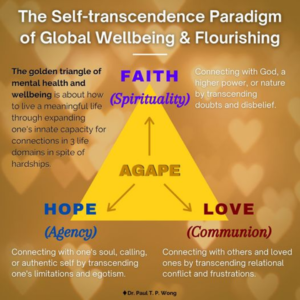
These three golden rules can be viewed as the three spiritual laws essential for human flourishing. Seligman’s (2011) PERMA model may be sufficient to achieve flourishing in times of peace and prosperity, but we need faith, hope, and love to co-create a bit of Heaven in the midst of the worst hell on earth. The golden triangle places us to where we belong – a part of God’s creation and a part of the human family. Therefore, our wellbeing is inextricably linked to something much larger than ourselves.

The above meme is just another way to summarize the benefits of the three spiritual laws. Furthermore, the Golden Triangle is always accompanied by the Iron Triangle with courage at its center. Faith in the omnipotent God automatically endows us with the courage because God’s answer is: ” Be strong and courageous. Do not be afraid or terrified because of them, for the LORD your God goes with you; he will never leave you nor forsake you.” (Deuteronomy 31:6 NIV).
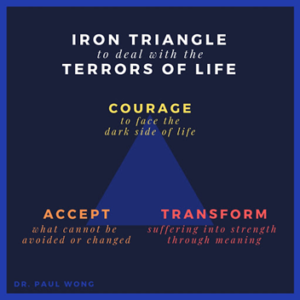
The Iron Triangle recognizes that when control and commitment are no longer possible, one can always resort to the existential courage to accept our hard fate or misfortune and transform the meaning of suffering into a hero’s journey as ways of coping with what is beyond human control (Wong, 2017).
The executive processes, according to the self-transcendence paradigm, are anchored in a strong sense of responsibility – we are both ethically and instrumentally responsible for making the right choice and getting the job done, no matter how difficult the situation. Being a part of the central microprocessors , along with the golden and iron triangles, one receives divine support in one’s daily heroic effort. Thus, self-control, self-determination and self-awareness depend on ego strength (internal control) as much as on trusting in God’ guidance and protection (external control) in a two-dimensional space (Wong & Sproule, 1984).
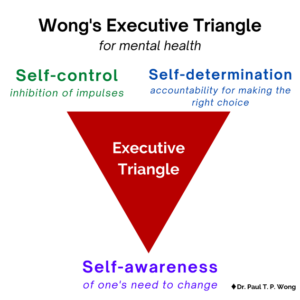
The last set of microprocessors is known as the Creativity Triangle, whose main function is to find a way out in desperate situations through imagining all possible solutions and finding inspiration from giants in the past or from the treasure trove of ancient wisdoms, such as the Bible or Tao Te Ching.
According to Homer-Dixion (2011), the challenge for the 21st century is not the shortage of resources but the ingenuity gap. That is why future leaders and workers need to rise to the challenge by dreaming impossible dreams and have the courage take good care of both the environment and the human need for resources.
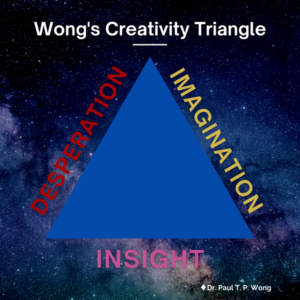
Unlike the American brand of positive psychology, the self-transcendence paradigm of PP 2.0 focuses on integrating the bright and dark sides of life as two sides of the same coin. In my recent review on Compton’s positive psychology textbook (Wong, 2020b), I singled out Kaufman et al.’s (2019) research on contrasting the light vs. dark triad of personality as an example of PP 2.0. I also suggested the next step to research on the joint effect of light and dark sides of life as co-variants working together on one’s wellbeing and flourishing.
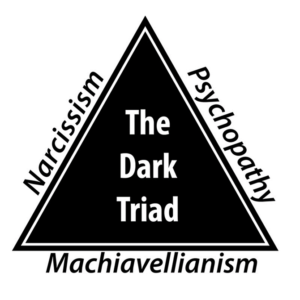
Conclusions
Throughout my presentation, I emphasized that in the era of post-COVID-19, the inverted pyramid model of servant leadership and self-transcendence is needed because:
- It creates an organizational culture based on connections, resilience, responsibility, and creativity.
- It encourages a leadership style that optimizes flexibility in adaptation to change.
- It empowers workers and develops the potential of human resources.
- It inspires leaders and individuals to face an uncertain future with faith, courage, and ingenuity.
- More importantly, it helps to achieve wellbeing and mature happiness (Wong & Bowers, 2018) through integrating a divided self and a polarized nation.
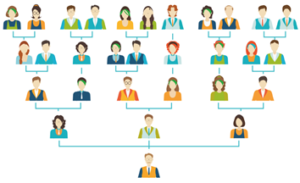
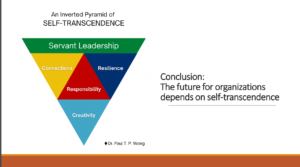
References
- Anderson, R. (2021). The divine feminine Tao Te Ching: A new translation and commentary. Inner Traditions.
- Congressional Research Service. (2021). Unemployment rates during the COVID-19 pandemic: In brief. https://fas.org/sgp/crs/misc/R46554.pdf
- David, S. (2016). Emotional agility: Get unstuck, embrace change, and thrive in work and life.
- Frankl, V. E. (1946/1985). Man’s search for meaning. Washington Square Press.
- Homer-Dixion, T. (2001). The ingenuity gap: Can we solve the problems of the future? Knopf Canada.
- Jones, L., Palumbo, D., & Brown, D. (2021). Coronavirus: How the pandemic has changed the world economy. BBC News. https://www.bbc.com/news/business-51706225
- Kaufman, S. B., Yaden, D. B., Hyde, E., & Tsukayama, E. (2019). The light vs. dark triad of personality: Contrasting two very different profiles of human nature. Frontiers in Psychology, 10, 467. https://doi.org/10.3389/fpsyg.2019.00467
- Koltko-Rivera, M. E. (2006). Rediscovering the later version of Maslow’s hierarchy of needs: Self-transcendence and opportunities for theory, research, and unification. Review of General Psychology, 10(4), 302-317.
- Maslow, A. (1971). Farther reaches of human nature. McGraw-Hill.
- New International Version (NIV) Bible. (2011). New International Version (NIV) Bible (Original work published 1978). Biblica.
- Seligman, M. E. P. (2011). Flourish: A visionary new understanding of happiness and well-being. New York, NY: Free Press.
- Wong, P. T. P. (2012). Positive Management. Presented at the 3rd Australian Conference of Positive Psychology and Wellbeing, Wollongong, Australia. https://www.academia.edu/2997735/Positive_management
- Wong, P. T. P. (2017). Coping and stress. In A. Wenzel (Ed.), The SAGE encyclopedia of abnormal and clinical psychology (pp. 886-890). New York, NY: Sage.
- Wong, P. T. P. (2020a). President’s Column: 7 Reasons Why the New Normal May Be Good for You. Positive Living Newsletter. http://www.drpaulwong.com/7-reasons-why-the-new-normal-may-be-good-for-you/
- Wong, P. T. P. (2020b). The maturing of positive psychology and the emerging PP 2.0 [Book review of Positive Psychology (3rd ed.) by William Compton and Edward Hoffman]. International Journal on WellBeing, 10(1). https://doi.org/10.5502/ijw.v10i1.885
- Wong, P. T. P., & Bowers, V. (2018). Mature happiness and global wellbeing in difficult times. In N. R. Silton (Ed.), Scientific concepts behind happiness, kindness, and empathy in contemporary society (pp. 112-134). Hershey, PA: IGI Global.
- Wong, P. T. P., & Gupta, V. (2004). The positive psychology of transformative organizations: A fresh perspective and evidence from the Anglo context. In V. Gupta (Ed.). Transformative Organizations. (pp. 341-360). Sage Publications.
- Wong, P. T. P., & Page, D. (2003). Servant leadership: An opponent-process model and the revised servant leadership profile. Presented at the servant leadership roundtable. http://www.drpaulwong.com/wp-content/uploads/2013/09/Wong-Servant-Leadership-An-Opponent-Process-Model.pdf
- Wong, P. T. P., & Roy, S. (2018). Critique of positive psychology and positive interventions. In N. J. L. Brown, T. Lomas, & F. J. Eiroa-Orosa (Eds.), Routledge international handbooks. The Routledge international handbook of critical positive psychology (pp. 142–160). Routledge/Taylor & Francis Group.
- Wong, P. T. P., & Sproule, C. F. (1984). Attributional analysis of locus of control and the Trent Attribution Profile (TAP). In H. M. Lefcourt (Ed.), Research with the locus of control construct (Vol. 3): Limitations and extensions (pp. 309-360). New York, NY: Academic Press.
Cite
Wong, P. T. P. (2021, February 4-7). Transcend the pandemic: How to redesign the future of work [Symposium]. Society of Counselling Psychology annual convention [online convention]. http://www.drpaulwong.com/transcend-the-pandemic-how-to-redesign-the-future-of-work

 Meaning Conference 2025 will be the INPM’s first in-person conference with a virtual option after the pandemic.
Meaning Conference 2025 will be the INPM’s first in-person conference with a virtual option after the pandemic.